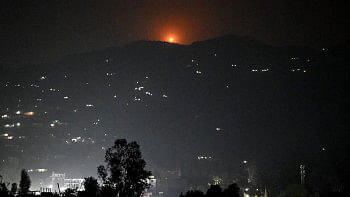Mashrafe's magic

Sitting in an Afghani restaurant called Bamiyan Kabob in Toronto, I was chit-chatting with a couple of my teammates at the end of a long practice session a few days ago. Cricket runs in my family, and as such, I decided to be a part of a Toronto-based cricket team called Bangla Cricket Club - a scheme for me to run away from the academic stresses of being a student at the University of Toronto. While we were enjoying the Afghan delicacies, the manager of our team, Shams bhai, asked me a simple question. Why do Bangladeshis love Mashrafe Mortaza so much? It got me thinking, and if looked at from a broader perspective, the answers are intriguing.
Let us first look at the statistics. Thirty-three years old, 230 wickets in 175 ODI matches, 42 wickets in 54 T20 Internationals and 78 wickets in 36 Test matches. Good, but not lethal numbers for someone who supposedly is Bangladesh's all-time leading bowler. And yet we love him more than the average Bangladeshi cricketer. Bangladesh has produced the likes of Shakib Al Hasan, Tamim Iqbal and Mushfiqur Rahim - all of whom are stardom material when it comes to the cricketing world. And yet we move past that, and find something unique to love about our Captain. The secret to the answer regarding why we love Mortaza so much, must be analysed by looking beyond the mere avenues of statistical analysis. He means more to us, because he gives more to us. He means more to the country, because he represents the very roots of this country. A hard-working professional, a patriotic citizen and a committed servant of the game - how can we not love him?
To understand Mashrafe Mortaza, we must try and understand the Bangladeshi mindset regarding issues beyond cricket. Bangladesh is a middle-income country of diligent individuals fighting it out every day to make a living. For whatever reason, Mashrafe has been able to resonate with this very characteristic of the Bangladeshi thought-process. He represents not just the best in us, but the practicalities of life that we face every day. Everyday hurdles are a common feature of the Bangladeshi lifestyle and Mashrafe's are no different. Throughout his career, our national team Captain has had to face tumultuous injury concerns threatening the only thing he lives and breathes for. His doctors till today remain wary about giving a 100 percent green signal to him, to play a full tournament. Sources suggest that Mashrafe's post-playing days will see severe problems for his already fragile knees. Under normal circumstances, a sportsman would retire to take care of himself, especially given he or she is approaching the natural age of retirement. Yet Mashrafe has faced these issues since 2005. And every time he has fallen, he finds a way to rise back up. That is what Bangladeshis love about him - his fight, his guile, his resilience. He is unique in that aspect and for that this country owes him its gratitude.
Of course, circumstances also illuminate our national captain. The likes of Akram Khan, Khaled Mahmud, Khaled Masud and Habibul Bashar did indeed have the love and affection of our country when they captained Bangladesh, but success was hard to come by. Mashrafe Mortaza now leads a team of star-studded individuals, and has gone into the Champions Trophy with what is probably Bangladesh's finest international squad in its cricketing history. Under Mashrafe's captaincy, Bangladesh has gone from being a mediocre ODI side to one which can challenge and defeat the best in the world. His individual performances have been outshined in this period by his leadership qualities. Again, Mashrafe is no master tactician like Sourav Ganguly, neither does he have the enthusing abilities of an Imran Khan. He is much simpler than that. Much more normal. And it is in this normalcy, and in the normalcy of the passion exuberated by a middle-class man from Narail, where our national team and indeed the countrymen see its finest leader. And it is this leader who has held and nurtured a combination of youth and experience, and strongly supported, if not created, the successful national team structure that we have today.
Bangladesh is today a country which is fighting its way to the top of the socio-economic food chain. Yet amidst this, we face severe social problems of radicalism, political discord, corruption and instability. In such a scenario of discomfort and concerns, cricket brings joy to the faces of its citizens. It unites people. It creates a sense of community. From the rickshawala working every day to earn a daily living to feed his children, to the rich businessman creating jobs for thousands, people of all social ladders feel united under the roof of sport. And when we have a Captain like Mashrafe Mortaza leading the nation in global tournaments, we feel a sense of pride unlike anything else. When Mortaza invokes the spirit of 1971 in his post-match press conferences, we get goosebumps. When Mortaza loudly and proudly sings the national anthem prior to the start of international matches, the country sings with him in reverence and patriotism. When Mortaza charges in to bowl with a fragile knee, the country remains motivated. Yes, we can, it says. It is because Mortaza reminds us of who we are as a people. From the rickshawala to the businessman, stands by him. And as long as he remains the braveheart that he is, Bangladesh will unequivocally stand by its captain.
Bangladesh went into the ICC Champions Trophy 2017 against tough opponents. In 2006, West Indian legend Brian Lara claimed that Bangladesh was not ready to participate in the Champions Trophy. Lara was probably right. But today we are ready. We are ready with a Captain who will lead from the front - unafraid, undeterred and solely determined for Bangladesh's success. And his team will follow suit. While reality suggests that he is coming to the end of his international career, Mashrafe Mortaza will go down in history as Bangladesh's greatest and, dare I say, its most loved skipper. An icon, a hero, an inspiration - the country wishes him and the national team the best of luck in its endeavours in England and in the years to come.
The writer is a fourth year undergraduate student of Economics and International Relations, University of Toronto.
Email: [email protected]

 For all latest news, follow The Daily Star's Google News channel.
For all latest news, follow The Daily Star's Google News channel. 



Comments